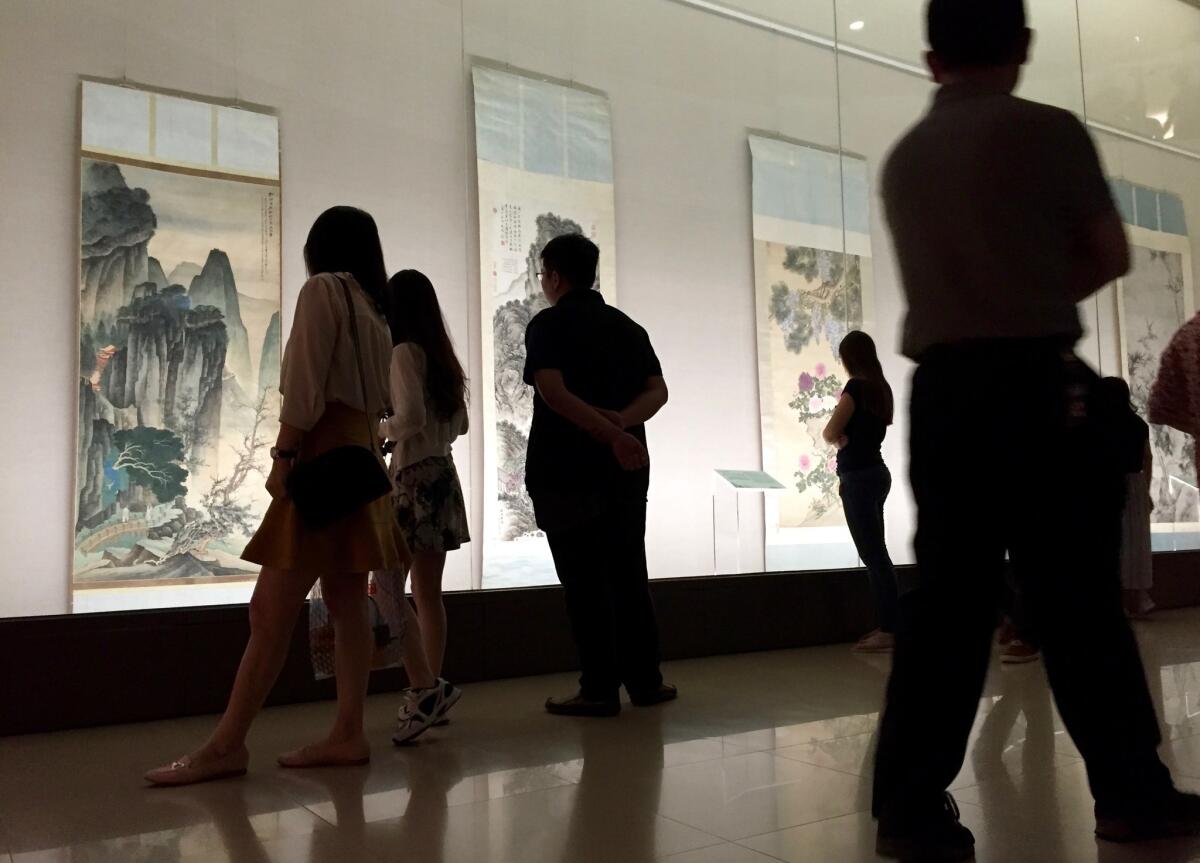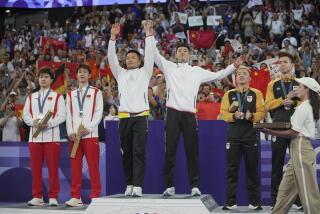As tensions over Taiwan’s national identity reignite, tourists from mainland China avoid the island

Reporting from Taipei, Taiwan — A Taiwanese tour guide stood outside the National Palace Museum and waited for crowds she didn’t expect to see.
Last October, the line snaked through the lobby, out the front door and across the outdoor pavilion. This year, about a dozen people stood at the admissions counter.
China’s weeklong National Day sees a global migration of millions, with an onslaught of visitors to Taipei’s hillside gallery. The museum boasts one of the world’s most expansive collections of Chinese art, an array of imperial jade, ancient bronze vessels, calligraphy and rare books.
But the city’s premier draw this month lacked many of the people who generally fill its halls: tourists from mainland China.
Mainlanders “are going elsewhere,” said Tung Meng Ching, 40, the tour guide who looked out at a half-empty lobby. “Our president,” Tung said, trailing off, “you know.”
The absence reveals a deepening rift over Taiwan’s national identity. Mainland tourism has dropped 20% since June, weeks after President Tsai Ing-wen took power and declined to endorse the notion that Taiwan and the mainland are part of one united China.
During the holiday, half-filled tour buses drove through Taroko Gorge National Park and hotels flashed vacancy signs along the beachfront east coast.
Each side blames the other for the drop, with Taiwanese officials accusing a heavy-handed mainland government of blocking travel and Beijing administrators slamming the island’s leaders for making tourists feel unwelcome. The discord underscores the challenge Taiwan faces as it weighs economic dependence on Beijing against greater autonomy for the island.
The decline is “mostly due to the mainland’s political interference and restriction on mainland tourists visiting Taiwan,” said Chiu Chui-cheng, spokesman of the Mainland Affairs Council, the agency that handles policies with China.
Mainland travel agents received implicit government orders to limit island-bound travel, Taiwan’s Travel Quality Assurance Assn. warned earlier this year — more a nudge than a directive.
Several Chinese travel agencies cited a decrease but did not attribute it to government intervention.
Chinese officials deny capping tourists. Taiwan Affairs Office spokesman Ma Xiaoguang, at a news conference last month, linked the tourism decline to the Taiwanese government’s refusal to support a tacit agreement that only one China exists, albeit with different interpretations. Beijing refers to this as the 1992 Consensus.
“We are very clear about the reason causing the loss to Taiwan’s tourism-related industry,” he said. “Whoever started the trouble should end it.”
The Taiwan Affairs Office did not respond to requests for comment.
Thousands of tourism workers recently took to Taipei’s streets to demand help restoring those numbers. Taiwan’s Central Bank governor late last month called falling tourism a risk to economic growth.
The travel slump is particularly telling because both sides have touted tourism in recent years as a sign of improved relations after a 60-year stalemate. Mainland visitors to Taiwan reached a record high last year, according to the Chinese government, making up about 40% of tourists to the island.
And yet Chinese group travel during the holiday’s first four days dropped 56% from last year, according to the island’s National Immigration Agency.
Mainland visits to Russia during the so-called Golden Week rose 103%. Chinese travel to Japan jumped 34% from January to August compared with the same period last year.
The refusal to acknowledge one China “reduces ordinary citizen’s motive to go to Taiwan,” said Liu Xiangping, head of Nanjing University’s Institute of Taiwan Studies.
Mainlanders from more rural areas can only visit Taiwan on group tours, some of which warn participants about avoiding spots where the “false flag” is flown or visiting government departments.
Tensions grew in July when a tour bus caught fire in Taiwan and killed 24 mainland Chinese. The Beijing News covered its entire front page with the image of a blazing vehicle. Officials derided the island’s safety measures.
Beijing has suspended official communication with Taiwan, and sought to edge it out of global organizations. The International Civil Aviation Organization, which sets aviation industry standards, declined to invite the self-governing island to its meeting last month. It had to participate in this summer’s Olympics as “Chinese Taipei.”
The relationship has “developed from a stalemate to confrontation,” said Nathan Liu, an international affairs professor at Taipei’s Ming Chuan University.
China has considered Taiwan a runaway province since 1949, when Nationalist Party forces lost a civil war to Communist rebels and fled across the Taiwan Strait. The island governs itself as a democracy.
Former President Ma Ying-jeou accepted the one China philosophy and signed a flurry of deals to promote trade and investment. But Tsai’s independence-leaning Democratic Progressive Party unseated Ma’s Nationalist Party in January in an upset that highlighted apprehension about the mainland’s reach.
Now some worry about losing that economic safety net. Eight Taiwanese local leaders who support the one China policy recently traveled to Beijing to discuss how to steer tourism toward their cities.
Wu Kuan-ting, a tour coordinator at the Presidential Office Building, said the line outside has slumped from thousands to hundreds.
“Most of us would like to keep [the relationship] the way it is,” said Wu, 24, standing near red velvet ropes. “The tourism industry is facing a lot of change and it’s quite a big problem.”
While he spoke, workers on the other side of the building installed the grandstand for Tsai’s first National Day speech.
Tsai, in her holiday address, said Taiwan would “not bow to pressure” from China, even as she advocated talks and a continued relationship. The island celebrates its National Day nine days after the mainland, to mark an uprising that led to the demise of China’s last imperial dynasty.
Taiwanese officials have tried to reduce Beijing’s economic hold on the island by looking to Southeast Asia. But it’s unclear that will cover the gap.
The political tensions belie cultural ones. Some Taiwanese view Chinese visitors as abrasive and loud, while Chinese occasionally complain they feel disrespected.
“They’re always trying to antagonize us; they think they’re so special,” said Leon Wei, 27, a Beijing tech worker who has little interest in visiting the island. The latest issues, he said, might “reinforce this antagonizing.”
And yet many younger mainlanders embrace the opportunity to visit a place that calls itself the “Heart of Asia.” Even during this year’s holiday, Chinese tourists sampled sweet oyster omelets in Taipei’s night markets and peeked at back-alley shrines in the historic southwestern city of Tainan.
Gong Kunning leaned off the ledge of a mountaintop temple at Taroko Gorge, attempting a group photo with her selfie stick.
“People here are warm and kind-hearted,” said Gong, 26, a finance worker in the southern city of Shenzhen. She’d traveled to Taiwan once before but returned because her friends wanted to go.
“Just say I love the culture,” she said, as the other women whispered for her to stop talking. “It’s too sensitive.”
Nicole Liu and Yangzhi Yang from the Times’ Beijing bureau contributed to this report.
Meyers is a special correspondent. Follow her @jessicameyers on Twitter.
ALSO
Taiwan’s ties with China slip as new president fumbles for a formula
America’s best idea may be China’s, too, as it expands national park system
China once struggled to feed it’s people. Now it’s seeing a rise in eating disorders.
More to Read
Sign up for Essential California
The most important California stories and recommendations in your inbox every morning.
You may occasionally receive promotional content from the Los Angeles Times.










